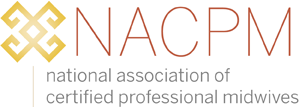A Letter from Mary Lawlor
Dearest friends and colleagues,
After 20 years with NACPM, including as a founder of the organization in 2000, ten years as president of the board, and ten years as executive director, I recently submitted my resignation to the Board and will be leaving my executive director position at NACPM early this year.
As you can imagine, I have a strong mix of emotions with this change. It has been the privilege of my life to have had this chance to work with the leaders of NACPM over these years - and with all of you - to help build an organization of ambitious, courageous vision, commitment, and accomplishment in service to our profession and to childbearing people in our country. I am most grateful to all of you and proud of all we have accomplished together since the founding of NACPM. I hold dear all the relationships we have built with each other, within NACPM and with colleagues and leaders of allied organizations, consumers and advocates, policy makers, funders, and more. I am excited to see all that is still to come.
While it is time for me to leave my position at NACPM, I am not leaving midwifery advocacy. I will continue to contribute to the field in these next years and look forward to sharing new ventures and to overlapping paths with you. The Board and I are working together to plan for and ensure a smooth transition for the organization, and I am tremendously excited about NACPM’s present leadership, including the new Board members and officers.
As recently shared, NACPM will soon announce the date for our Virtual Annual Membership Meeting to take place early this year. At the annual meeting, we will take some time to take stock and celebrate all we have accomplished together over these past 22 years.
I am sending love to all of you along with deep and sincere wishes for a truly transformational New Year in 2022!
Mary Lawlor, CPM, LM, MA
Executive Director, NACPM
From the NACPM Board of Directors
With profound gratitude and adoration, NACPM honors Mary Lawlor’s twenty plus years of service. Under Mary’s tutelage and visionary leadership, NACPM, a small but mighty organization, has grown over the years to advance the CPM credential both nationally and globally. Mary has been the compass of NACPM’s values, vision, purpose and commitments to be a powerful, collective voice for Certified Professional Midwives. Because of Mary’s diligence, NACPM has become integral to the development of state and federal policy to strengthen and support the inclusion of CPMs in the perinatal health system.
We ask you to join us in sharing your appreciation and memories to celebrate Mary and her work through this virtual appreciation board.
Mary’s history at NACPM is marked by trailblazing accomplishments. Mary secured association membership for NACPM to join the International Confederation of Midwives (ICM) as one of the primary midwifery organizations of the US; was one of the core leaders of United States Midwifery Education, Regulation and Association (US MERA), the historic convening that began consensus-building around midwifery in the US; raised over 2.7 million dollars to support NACPM’s work; challenged NACPM to begin engaging with core principles of justice and equity; mentored many NACPM board members, chapter leaders and staff; and, has worked to build strong collaborative relationships with partner organizations.
Mary Lawlor’s years of service have paved the way for generations of CPMs. Her legacy has birthed the central value of CPMs in serving as trusted primary birth care providers across the US. Above all else, Mary is kind, generous, thoughtful, loving and brings a sense of joy and possibility to all she does, while always centering the importance of meaningful relationships and human connection. We are because of what she has given.
Kiki Jordan, CPM, LM
NACPM Board President





































